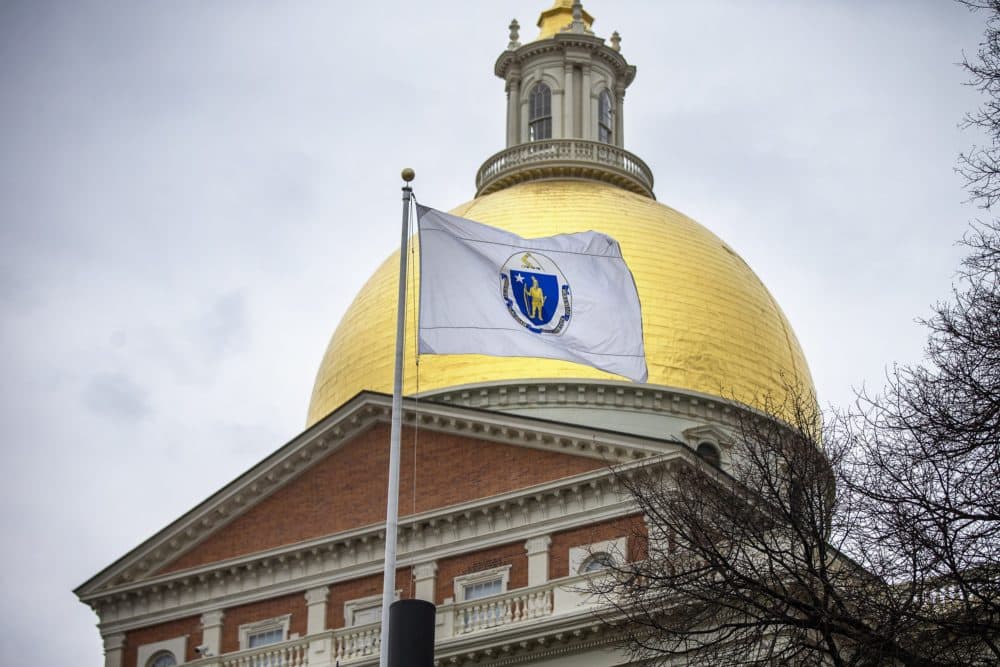Advertisement
Pandemic Policy Extensions Unfinished As Emergency Lifts

When the COVID-19 state of emergency ended at 12:01 a.m. Tuesday, Gov. Charlie Baker's order allowing remote public meetings also expired, as did the law allowing restaurants to sell alcoholic beverages to-go.
State lawmakers adjourned for the day Monday without completing legislation that would extend several popular pandemic policy adaptations beyond the state of emergency, leaving some measures linked to the order to lapse, at least temporarily.
The House plans to vote on Tuesday on its version of a policy extension bill, which like legislation the Senate approved last week would add several months' time to the remote meeting authorization, eviction protections and restaurant relief measures.
During a Monday afternoon event in Bridgewater, Baker said he was "hoping we're going to get a bill from the Legislature sometime before midnight" that would address expiring policies put in place both through executive order and statute.
But by that point in the day, the House and Senate had already adjourned until Tuesday, foreclosing the possibility of a bill reaching the governor's desk before midnight.
Four weeks ago, on May 17, Baker announced he'd end the state of emergency on June 15, saying at the time that he wanted to work with legislators "to deal with whatever is sort of undone by this."
He filed a bill the next week to temporarily extend three policies — virtual public meetings, special permits for outdoor dining and billing protections for COVID-related care — and last Thursday, the Senate passed a bill tackling those and other issues.
The House on Monday gave initial approval to an amended version of the Senate's bill, and plans to vote on that legislation in a session scheduled for 11 a.m. Tuesday, after the emergency's official end.
Before a bill can get to Baker, the two branches must agree on language — the House and Senate bills diverge on issues including telehealth rates, the billing protections Baker sought, and caps on the fees third-party delivery services charge restaurants. The Senate bill includes a temporary mail-in voting extension, while the House passed a separate bill last week to make mail-in voting a permanent feature of the state's elections.
The Senate has scheduled a 2 p.m. session for Tuesday, and could be ready to act after the House passes its bill.
On Monday, Baker said he hoped to get a bill "that would extend a number of both the things we did ourselves as administrative orders but also some of the things that the Legislature did on a temporary basis, to either extend until they can have hearings on those things or extend until they can sort of decide what they think the next move is."
The governor pointed to expanded outdoor dining as one policy change that's proven "enormously popular" and also noted programs that have expanded pedestrian and bicycle access in downtown areas.
"I think these are things that people are going to want to see continue on a go-forward basis, and I think that's part of the reason why both we and the Legislature feel a certain amount of pressure to get some of these resolved by midnight tonight or to have legislation passed that would extend them to some point in time when the Legislature can have a more formal conversation about what they want to do going forward," Baker said.
Some of the policies addressed in the pending bills will not lapse immediately — expanded outdoor dining permits will have 60 days until they expire, the law allowing remote notary services during the pandemic grants that permission for three business days after the emergency ends, and Baker and legislators agreed in March that mail-in voting provisions should remain in place through June 30.
Baker said Monday he'd "certainly like to see something happen with respect to town meetings."
Town meeting season is ongoing, and flexibilities lawmakers granted those assemblies during the pandemic include allowing remote representative town meetings and giving towns the ability to adjust their quorum requirements.
Advocates have also been urging lawmakers to prevent the expiration of pandemic eviction protections.
Pamela Schwartz, director of the Western Massachusetts Network to End Homelessness, warned Monday that an important protective measure aimed at staving off housing removals will expire when the calendar flips to Tuesday.
Under a COVID-era state law sometimes referred to as Chapter 257, courts are required to pause eviction cases for failure to pay rent if a tenant has an application pending for emergency rental assistance. Both the House and Senate bills would extend that section of the law until April 1, 2022.
"The bottom line is: Chapter 257 prevents people from becoming homeless during this COVID-19 recovery period," Schwartz told the Joint Committee on Racial Equity, Civil Rights, and Inclusion. "It has prevented a lot of people from becoming homeless already despite this current crisis, and we can't afford for it to end."
State House News Service's Chris Lisinski contributed reporting.